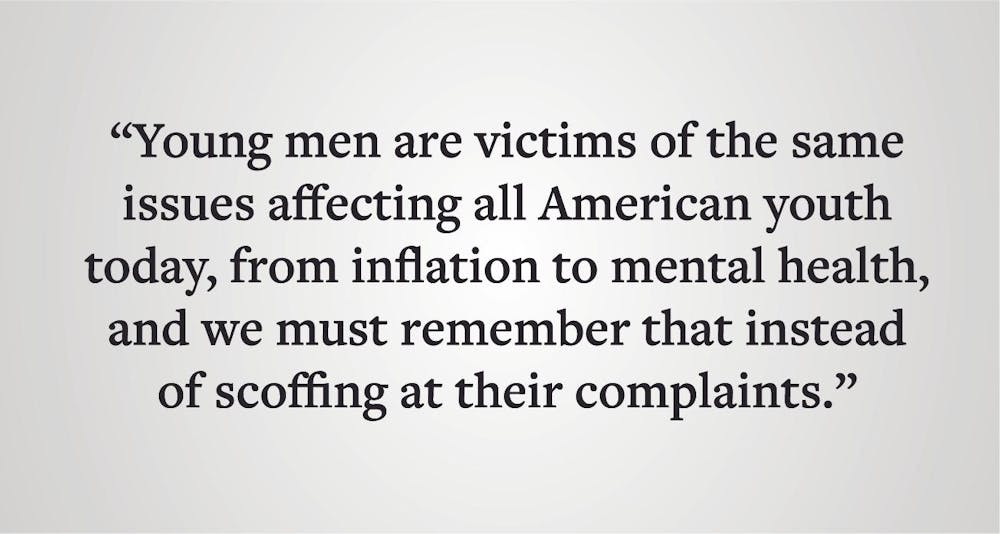The past few weeks have been nothing short of momentous. Within days of President Trump’s second inauguration, the United States government has withdrawn from the World Health Organization, reconsidered birthright citizenship and threatened Canada and Mexico with 25% tariffs across the board.
These seemingly radical ideas would have once been unthinkable, but the past decade has seen a major realignment in American politics. Never before has a president been elected on a platform so heavily laced with authoritarian and near-fascist overtones, but President Trump and the Republican Party still made significant gains among almost all demographics to win 312 electoral votes. Of these demographic changes, the most interesting to me is that of young men. Though the rightward shift of young men has been noted since at least 2016, this demographic swung a whopping 15 percentage points towards Trump in 2024 compared to four years previous.
Razor-thin margins in swing states often determine the outcome of national elections. Thus, even a minor shift could cost one party the presidency — a fact that has led scholars to intensely analyze the ever-increasing gap in political ideology between young men and women. Political scientists have proposed countless theories to explain this development, from backlash against the feminist movement to social disillusionment pushing men towards traditionalism. However, I believe the primary driver of this transformation stems from feelings of neglect.
Across the country, young men have increasingly felt ignored and unvalued by the left-wing movement. This resentment of perceived left-wing hypocrisy, extremism and blindness has played a major role in their rightward shift. Perhaps their rationale for supporting President Trump is poor and puts their intelligence up for debate, but such decisions are only natural in a two-party system.
I also understand that many would disagree with their claims, but I would like to remind us that our persistent stereotyping of conservative youth as white, ignorant and close-minded does nothing to help broaden our coalition. We are preconditioned to speak out against prejudice and social injustice, but now it is time to consider the consequences of our own internal biases.
As individuals, we represent the political ideologies we belong to. We must therefore continuously seek to understand how our actions and words affect the general public’s perceptions of our ideologies. It is our collective duty to reflect on where we fell short in welcoming the average straight man or anyone outside the progressive base into our movement.
The more painful question to ponder is whether or not it is time for us to moderate our public stances on the perceived leftmost aspects of mainstream Democratic platforms, such as affirmative action and LGBTQ+ rights. This is by no means an easy thought to digest, but I would argue that we cannot afford to bear the cost of alienating social moderates by focusing on the culture war if that cost is losing the presidency. Within a week of assuming office, President Trump has suspended recognition of non-binary identities and forced federal diversity, equity and inclusion employees to take leave. Amid the global far-right surge, I am concerned that we face political extinction if we don’t adjust our narrative to better appeal to our increasingly conservative audience.
Finally, I urge us to reconsider our public rhetoric about privilege. I worry that branding men as inherently privileged has become an excuse to ignore their issues, and invalidating people’s difficulties because they don’t belong to a certain demographic is a recipe for political disaster. Young men are victims of the same issues affecting all American youth today, from inflation to mental health, and we must remember that instead of scoffing at their complaints.
American history is defined by compromise and slow but steady progress. This country has never been the first to institute liberal policies like abortion, women’s suffrage or same-sex marriage, but we have always managed through a combination of activism, debate and trade-offs. Yet this often painfully slow process has also kept policy regression a rarity, and I encourage us to remember this as we forward our support for contemporary social justice movements.
Despite the defeats of the past election cycle, it shouldn’t be all doom and gloom for the political left. It is notable that not all of President Trump’s voters believe in everything he stands for. What this means is that the solution to the left’s current woes might be right under our noses. The Democratic Party cannot afford to continue losing members of the “privileged” class. I encourage us to instead focus on the many wide-reaching economic positives of left-wing platforms, from job creation to investment in small businesses, that benefit all Americans. Young men in particular are not so different from us; many contemporary problems affect all American youth. In the end, all it might take is a slight change in advertising strategy to make the Democratic Party the rational choice for this country once again.
Lucas Guan’27 can be reached at lucas_guan @brown.edu. Please send responses to this column to letters@browndailyherald.com and other opinions to opinions@browndailyherald.com.





